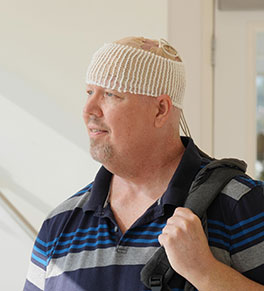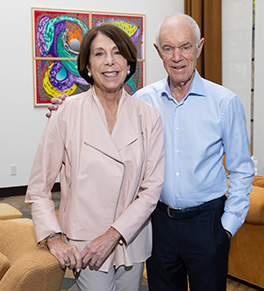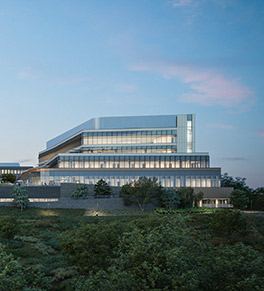
Glioma
A glioma is a brain tumor that’s usually cancerous, though not always. Our experts intervene rapidly to treat your condition.
Signs or symptoms of glioma
Some of your symptoms will depend on where your brain tumor is located. For example, if a tumor presses on your optic nerve, your vision may be impaired.
These are typical symptoms of glioma:
- Headaches, especially in the morning
- Nausea and vomiting
- Cognitive problems – difficulty speaking and understanding
- Loss of memory
- Changes in personality
- Blurred or double vision, or no peripheral vision
- Seizures, particularly when there’s no previous history

Pay attention to your symptoms
If painful headaches, mood swings, personality changes or seizures have emerged without warning, please reach out to our experts. One of our physicians will return your call within 24 hours.
Call 714-456-8000 to make an appointment.
We welcome referrals from community physicians.
To refer a patient to our program, call 714-456-8000 or fill out an online request form. You may also email us at www.ucihealth.org/medical-services/brain-tumor-program/email-us.
One of our brain tumor physicians will return your call within 24 hours. We can see your patient in our offices within 48 hours after insurance approval.

Find a Cancer Clinical Trial
Talk to your doctor to see if a cancer clinical trial is right for you.

Lorin Jensen, UCI Health patient who was successfully treated for a gemistocytic astrocytoma — a type of glioma and among the deadliest of all brain tumors.
“Dr. Bota stops at nothing to keep me on the right track with the treatments that keep me alive and improve my quality of life.”
Featured Blog Posts

A 'dream come true' realized in Irvine
Dr. Michael J. Stamos once envisioned opening a small cancer center on the UC Irvine campus. What has emerged, he says, is so much more.

Devoted donors pay it forward

Reimagining cancer care for all of Orange County
When it opens July 16, the Chao Family Comprehensive Cancer Center’s newest location will offer superior care, comfort and convenience.
Types of glioma brain tumors
Glial cells are the most common type of brain cells we have. Their job is to protect and support your neurons.
There are three types of glial cells that can mutate and form gliomas called astrocytomas, oligodendrogliomas and ependymomas.
- Astrocytomas range from slow-growing or benign to out-of-control and severe, like a glioblastoma brain tumor
- Oligodendrogliomas are less common than astrocytomas and can cause seizures
- Ependymomas are usually in the base of the brain, and you may experience balance problems and other typical symptoms
Our approach to a glioma diagnosis
We have the largest and most experienced brain tumor team in Orange County.
At UCI Health, we take a system-oriented, multi-specialty approach to your diagnosis. Our physicians have had fellowship (specialized) training in brain tumor treatment across these and other areas:
- Neuro-oncology
- Neuropathology
- Neuropsychology
- Neurosurgery
- Radiation oncology
They bring sophisticated expertise as well as a compassionate touch to your care.
Part of our approach is to also educate our fellow doctors who work in primary care and other specialties. We increase their knowledge about when it’s appropriate to order a brain CT or MRI. This approach helps the entire community find tumors that might otherwise be missed.
Diagnostic services available for a glioma
During our consultation, we’ll discuss your symptoms.Then we’ll make an evaluation using advanced diagnostic tests to confirm or rule out whether you have brain cancer.
Glioma treatment at UCI Health
We’ll treat your glioma based on the results of your diagnostic tests.
Our neurosurgeons make every effort to use the least invasive procedures, removing the tumor through tiny incisions. The objective is to remove all or most of your glioma without disrupting nearby healthy tissue.
We use radiation therapy and stereotactic radiosurgery to send powerful, carefully targeted beams to destroy cancer cells. TrueBeam® is an advanced radiation oncology system that shrinks tumors far faster than other tools. For you, that means much shorter treatment times, faster recovery and less discomfort.
Chemotherapy helps us destroy cancer cells using one or a blend of medications. Our neuro-oncology physicians specialize in both cancer and brain disorders. They will tailor a chemo treatment based on your specific needs.
How to work with us
We often find that brain tumor patients come to us after visiting the emergency room for acute symptoms. If you suddenly have difficulty speaking or thinking, confusion, seizures or severe headache, go to the emergency room.
Or you may have already received a diagnosis and are seeking the next phase in your treatment. You are always welcome to reach out to us directly at the UCI Health Brain Tumor Program.
Why choose UCI Health for glioma care?
The National Cancer Institute (NCI) designated us as a comprehensive cancer center
We’re the only cancer center in Orange County with that distinction. The NCI only gives this elite designation to 1.3% of cancer centers.
We earned this status by demonstrating consistently excellent care, integrating cancer research into our treatments and serving the local community.
And when it comes to brain cancer and brain tumor care, we work thoroughly but rapidly to get you the best possible result.
As an academic medical center, our research and clinical trials are nationally and internationally known
Once you are working with us in the UCI Health Brain Tumor Program, you can be considered for the experimental treatments in our clinical trials. If there is an appropriate trial available and you qualify, you may get access to novel treatments that aren’t yet widely available.
When you’re a brain tumor patient at UCI Health, you’ll see a neuro-oncology hospitalist every day you stay in the hospital
They will make sure you get daily personalized attention, minimizing or eliminating complications from your treatment. They’ll coordinate your care, may prescribe medications and monitor your progress.




